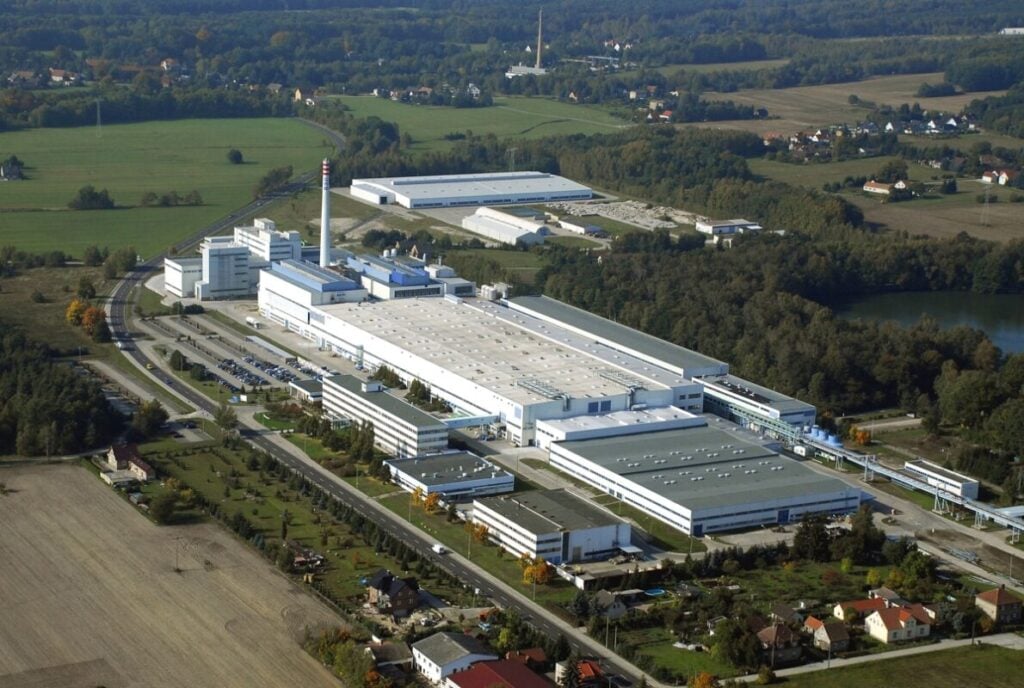
German solar glass manufacturer Glasmanufaktur Brandenburg (GMB) has filed for insolvency due to what its parent company called “the absence of clear policy announcements and support”.
GMB is one of Europe’s last solar glass manufacturers, with a daily production capacity of 350 tonnes and 247 employees at a facility in the eastern German municipality of Tschernitz. However, the company has endured tough financial times in recent months, applying for short-term work for its staff in January of this year as demand for its products dried up, leading to monthly losses of €900,000 (US$1.05 million).
Try Premium for just $1
- Full premium access for the first month at only $1
- Converts to an annual rate after 30 days unless cancelled
- Cancel anytime during the trial period
Premium Benefits
- Expert industry analysis and interviews
- Digital access to PV Tech Power journal
- Exclusive event discounts
Or get the full Premium subscription right away
Or continue reading this article for free
According to Ashok Jain, a director at Borosil Renewables, the Indian glass manufacturer that has been the company’s majority shareholder since October 2022, demand for its products fell as low as 40% of its production output at the beginning of this year. GMB filed for insolvency last Friday (4 July) and its operations will now be overseen by a court-appointed administrator in Germany, with Borosil Renewables no longer factoring the company’s losses into its financial results.
The news is another blow for the European solar manufacturing sector, which has endured a tumultuous year. Meyer Burger has scrapped module production facilities in the US and filed for insolvency for its European cell production facilities, leaving the long-standing industry leader without any manufacturing facilities of any kind; Borosil Renewables highlighted the decline of this “stellar name” in European manufacturing to illustrate the challenges faced by European PV manufacturers at present.
Borosil Renewables blamed these market conditions on the flooding of the European market with “severely underpriced solar modules” from China, and a lack of policy support to protect European manufacturers from Chinese products available at much lower prices.
The oversupply of Chinese modules to Europe is nothing new, with China alone supplying Europe with close to 200GW of modules between the start of 2023 and the end of 2024; European buyers accounted for 94GW of the record 235GW of Chinese exports recorded in 2024. Despite reports of decreasing confidence among European solar purchasers in June this year, the fact that the US is ramping up its anti-China rhetoric could encourage Chinese manufacturers to redouble their efforts to sell their products in other markets, such as Europe, potentially extending this oversupply issue into the future.
Borosil to refocus on India
Borosil noted, however, that the insolvency would “free up resources and management bandwidth” to expand its Indian operations. The company currently has 8.5GW of global glass manufacturing capacity, but has already announced plans to expand its Indian operations further; in March, Borosil Renewables vice-chairman Shreevar Kheruka announced it would seek to expand its 6.5GW manufacturing facility in Gujarat to 10GW by July 2026.
The outlook for the Indian solar sector is notably more positive than in Europe, with JMK Research expecting more than 28GW of new capacity additions in the 2026 financial year alone. This is also true for the manufacturing sector, particularly as the US is looking beyond Chinese and Southeast Asia to source its solar products.
“Businesses in the US are keen to move away from China and find an alternative,” Vinay Rustagi, chief business officer at Indian manufacturer Premier Energies, told PV Tech Premium earlier this year. “We have good visibility in terms of demand at Premier as well as global wafers export, and we are in discussions with the US cell manufacturers.”
Indeed, Rustagi said that the Indian government has implemented a number of supportive policies to incentivise investment in the Indian manufacturing sector, which contrasts with Borosil Renewables’ assessment of the European policy landscape.
“Moreover, supportive government policy, including the five-year anti-dumping duty introduced in December 2024, is creating a level playing field for Indian manufacturers,” said Borosil Renewables in its announcement of the GMB insolvency. “Prices for solar glass have strengthened significantly, with Q4 FY25 average ex-factory prices up 28% year-on-year as a result of a gradual increase in the selling prices towards the reference price under Anti-dumping duty measures applicable to imports from China.”
This kind of policy framework has led to a flurry of new manufacturing projects in India in recent weeks, including both Premier Energies and Ahaan Solar announcing new tunnel oxide passivated contact (TOPCon) production plants.






